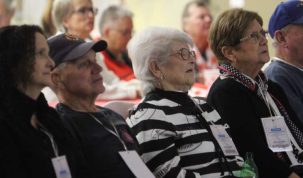By Cecilia Nasmith/Today’s Northumberland
The St. George’s Anglican Church Friday-morning breakfast-and-fellowship time in Grafton was unusually packed June 13, thanks to a special guest – Northumberland-Peterborough South MPP David Piccini.
Piccini pitched in with the cooking and serving to some 70 members of the community, including Alnwick-Haldimand and Cramahe Township mayors and councillors, representatives of Transition House and its Community Liaison Committee, and members of the local community and neighbouring churches.
The visit came in response to the petition circulated by members of St. George’s Social Justice Committee appealing to him to support the application, submitted in October by Northumberland County and Northumberland Hills Hospital, for a Homeless and Addiction Recovery Treatment Hub.
“With the opening of 310 Division Transition House in Cobourg, we see a HART Hub like possibility for providing comprehensive, locally tailored support to individuals, including marginalized groups who are experiencing or at risk of homelessness. This service delivery gives rural area people a place to go and it will ensure equitable access to primary care, mental health services, addiction treatment, social services and essential needs such as shelter, food and hygiene facilities,” the petition stated.
Introducing the MPP, Rev. Helena-Rose Houldcroft said the homelessness issue “has certainly been on the hearts and souls and minds of the people of St. George’s and the wider community.”
Piccini said that if current systems in place were effective, there would have been no housing crisis.
Improved productivity is essential to making progress on this front, he insisted, describing programs his government has established to increase the numbers of skilled workers in reliable employment.
As well, he said, “We have been working with our municipal partners – you’ve got to move permits faster, we have got to get shovels in the ground.”
Community partners will play a key role, he continued, such as the Port Hope United Church seniors’-housing project being planned and the Rebound Child and Youth Services Northumberland’s Night Stop program for young people at risk.
“I cannot govern my way out of this problem – I have to work with you,” he said.
An audience member pointed out Haldimand Court, the Grafton complex that offers a number of low-cost units for seniors – the result, she said, of local churches coming together in the 1980s.
Transition House Executive Director Ike Nwibe also took the opportunity to speak, not only of the individuals who have taken shelter at Transition House but the 11 – to date – who have been helped to find permanent housing.
Less well known is the work they do in helping homeless individuals get caught up on their taxes and obtain official identification. He calls this making an individual “housing-ready, so when the opportunity comes, they are prepared.”
The services they offer, in partnership with a growing list of community agencies, in effect give the homeless a new and more supportive community – “that light at the end of the tunnel they are bringing into somebody’s life.”
It can happen to anyone, with as little impetus as one unfortunate choice to make all the dominoes fall down.
“Unfortunately, we expect them to overcome those challenges in a matter of days,” Nwibe said.
“It too them a long time to get there. It’s going to take that long for some people to get back.”
Though Piccini cited a 2,8% increase to come next month to the Ontario Disability Support Program,
Nwibe noted that – other than that – ODSP and Ontario Works rates haven’t risen since 2018.
“This is what we are having to deal with. It’s not something I can solve by the push of a button at 310 Division,” he said.
“Somebody doesn’t just choose to start a drug just for the hell of it. Something happens to them to put them in that position,” said one woman, who proceeded to put a face on the homelessness issue.
She had lived in the community almost all her life and is now a volunteer affiliated with Transition House. Having lost her job, faced with a $35,000 student-loan debt, struggling with mental and physical problems, she lives with her daughter in a room at her mother’s house – meaning, should anything happen to her mother, the two of them will be homeless.
She is not a woman fleeing domestic violence, so the Cornerstone Family Violence Prevention Centre shelter would be to no avail. And she could not take her child to Transition House.
“I live right beside 310,” she said.
“These individuals look out for me. These individuals look out for my daughter.”
She attacked government legislation known as Bill5 (for taking away the rights of those who were on our lands before us), Bill 6 (for punitive measures against the homeless) and Bill 10 (for giving landlords increased latitude to refuse to rent to certain individuals).
“You are putting more harm on these individuals than you are doing good,” she insisted.
With the average rental price for a one-bedroom apartment in Cobourg in the $1,500-to-$2,000 range, she said, landlords are being given power to take that even higher.
“I would respectfully disagree,” Piccini said, noting that some of the legislation she cited has no direct impact on homelessness.
“We have been doing the same thing for a number of years – we cannot continue to do that same thing,” Nwibe commented, calling for an all-hands-on-deck approach.
Another audience member described how her seven-year-old grandson’s heart was touched by a homeless man huddling with two dogs. He talked her into giving the man some money, gave it to the man himself, and proceeded to engage in a long conversation about the man’s dogs and how he tried to make sure they were cared for.
“Have you taken the time to say hello to these people, ask them how they are doing?” she asked.
At the same time, Piccini pointed out that the owners of neighbouring businesses who have invested their whole lives into building them up have a right to be heard as well.
























